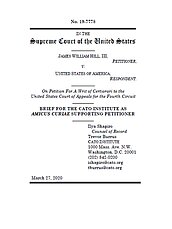Nowhere in the Constitution is Congress empowered to make a hate crimes law. In fact, the only crimes Congress is explicitly allowed to punish are counterfeiting and “Piracies and Felonies committed on the high Seas, and Offenses against the Law of Nations.” There is, however, the Commerce Clause, which gives Congress the power to regulate commerce “among the several states.” Since the New Deal, when the Supreme Court began interpreting the clause extremely broadly, the Commerce Clause has been used to justify most laws passed by Congress. Since the 1990s, however, the Court has placed some limits on what Congress can do. In the 1995 Lopez decision, for example, the Court struck down the Gun-Free School Zone Act of 1990 for being a pure criminal law with no meaningful connection to commerce or economic activity.
The language of the HCPA attempts to avoid the decision in Lopez (and another case called Morrison) by limiting prosecutions to those that “interfere with commercial or other economic activity in which the victim is engaged at the time.” Mr. Hill’s attack did not interfere with Amazon’s output, and there is no reason to think that this case should not be dealt with by the state of Virginia. In fact, Virginia has a hate crimes law, which it is allowed to have under both the Virginia Constitution and the U.S. Constitution. The Framers envisioned that nearly every criminal prosecution would be carried out by the states, and Virginia is obviously competent enough to prosecute Mr. Hill.
Mr. Hill challenged his prosecution as unconstitutional. The district court agreed and ruled that the Commerce Clause does not grant Congress the power to punish intrastate, noncommercial hate crimes. The Fourth Circuit, however, in a divided panel, reversed the district court and upheld the HCPA. Mr. Hill is now petitioning the Supreme Court and Cato has filed a brief in support.
We argue that the power to regulate commerce between the several states does not allow Congress to address local social issues like hate crimes. Even without overruling expansive New Deal decisions like Wickard v. Filburn, the modern Supreme Court has limited Congress’s ability to criminalize noncommercial activity. Sometimes, as with medical marijuana, the Court has upheld criminal statutes that are part of a broader economic program, such as regulating the production, distribution, and use of controlled substances. The HCPA, however, is not part of a broader statutory regime. It’s a simple criminal law that goes beyond Congress’s constitutionally authorized powers.
The Court should take the case and reverse the Fourth Circuit. While the Commerce Clause has been stretched to a degree the Framers would never have imagined, it still provides some limits on Congress’s powers. Prosecuting hate crimes is beyond those powers.




